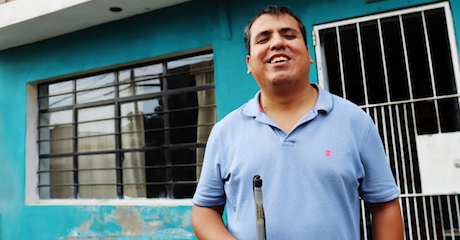When Carlos Espinoza was only 12 years old, he suffered from an accident that caused him to lose his sight. Confronted with a difficult situation, he had to quickly adjust to his new reality.
Espinoza faced a life on the margins. But today, he has become a favorite teacher at a UNICEF education program in Lima, Peru, for children on the move from Venezuela. The program is funded by Education Cannot Wait (ECW), the United Nations fund for education in emergencies and protracted crises.
UNICEF Peru and other strategic partners have provided Espinoza with new hope for the future. Teachers like him are providing refugee and migrant children with learning opportunities that help them survive and thrive despite the trauma of losing their homes, fleeing violence and conflict and seeking better futures.
In Lima, Peru, teacher Carlos Espinoza types lesson plans on his laptop. © UNICEF Peru
A future teacher’s path to an education
Before his accident, Espinoza loved to read, play and learn. After his vision became impaired, he faced terrible anxiety and fear. He tried to find courage in the worst moments.
But Espinoza is hard-working and passionate. He worked to get through primary and secondary school before continuing on to university. Motivated by his commitment to learning, he graduated from the Universidad Mayor de San Marcos in Peru in February 2021 with a degree in education, focusing on language, literature and communication.
“Today, technologies are available to blind people that allow them to have more autonomy over their learning,” says Espinoza. “Before, I depended on third parties to read to me or take a test. Now, I can read, write and use a cell phone with virtual reading technology.”
Even though he was highly qualified, positions for a person with a visual impairment were scarce or limited. Espinoza faced a grueling application process that put his disability label above everything he had worked so hard to achieve.
An inclusive employment opportunity
An ECW-funded diversity program implemented by UNICEF Peru and RET Americas finally allowed Espinoza to feel recognized for who he is, not for his disability. After an extensive interview process, he was selected for a tutoring position at a learning recovery program in the south of Lima.
Espinoza now works for the ECW-funded program to support refugee and migrant children in realizing their own dreams. It’s been a daunting task. But helping these vulnerable children continue their education in Peru has been one of the most rewarding experiences of his young career.
Through his work at the recovery program he is tasked, for the first time, with teaching a group of children without disabilities, something that he’d always dreamed about.
“The fact that I have a disability does not mean that I can only care for or teach children with disabilities,” says Espinoza. “What I like and what motivates me about this experience is that ECW has included me not because of my disability, but because of my abilities to teach children.”
During the pandemic, he led a “creative reading” workshop where he formed small virtual groups and allowed his students to respond critically and sensitively to the texts they read. They used their imaginations to construct books out of cardboard.
With Espinoza’s teaching and leadership, his class is able to think outside the box and try new strategies. Their learning has never been more playful.
Espinoza entertains his grandmother with stories about how much his students enjoy his innovative “creative reading” workshops. © UNICEF Peru
ECW and UNICEF address the unique needs of children in crisis
ECW has invested $1.8 million in the education in emergencies response in Peru to date. Through these investments, more than 600 teachers like Espinoza have received training and financial support to address the unique needs of refugee, migrant and crisis-impacted children.
The program is providing learning materials, building schools and taking steps to address the unique needs of children with disabilities.
Espinoza’s story speaks to the power of education to overcome challenges, and ECW’s commitment to supporting people with disabilities through all stages of their educational journeys. He is now contributing to the creativity, excitement and educational journeys of hundreds of vulnerable children enrolled in ECW-funded programs.
Education Cannot Wait’s High-Level Financing Conference provides world leaders everywhere the opportunity to stand with frontline heroes like Espinoza in transforming the landscape of education in crisis and building a more resilient future for vulnerable children everywhere.
“We should promote the love of language for all children. Reading is universal,” says Espinoza.
Top photo: In Lima, Peru, Carlos Espinoza, who lost his sight at an early age, teaches children on the move from Venezuela in a program run by UNICEF with funding from Education Cannot Wait (ECW), the United Nations fund for education in emergencies and protracted crises. © UNICEF Peru
